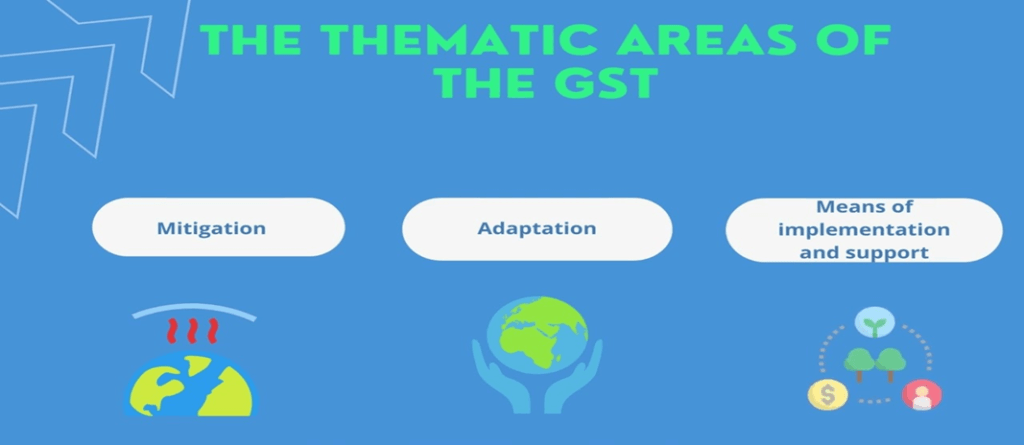The Global Stocktake (GST) is a significant event taking place in June 2023 at Bonn, Germany. It holds great importance in the context of climate change and has direct relevance to the IAS exam environment and ecology segment of GS Paper III. This essay aims to provide an understanding of what the global stocktake is, its potential outcomes, and its impact on climate action worldwide.
What is Global Stocktake?
The global stocktake is a mandated exercise under the 2015 Paris Agreement. Its purpose is to assess the progress made in combating climate change and bridging the adequacy gap. The stocktake focuses on various aspects such as greenhouse gas emissions reduction, adaptation measures, financial support, and the availability of technology. By evaluating these areas, the global stocktake aims to encourage a stronger global response to climate change.

Current Stocktake and Course Correction
The ongoing stocktake is the first exercise conducted under the Paris Agreement and is scheduled to take place every five years. Scientific evidence indicates that the current actions being taken are insufficient to limit the global temperature rise to 1.5 degrees Celsius, as outlined in the agreement. In order to achieve this target, emissions need to be reduced by nearly half by 2030 compared to 2019 levels. However, if current emission levels persist, the global temperature could rise by 3 degrees Celsius by the year 2100. Thus, the global stocktake plays a crucial role in assessing the effectiveness of climate action and identifying the need for course correction.
Bonn Meeting 2023
The annual meeting held in Bonn at the headquarters of the UN Climate Change Convention serves as a platform to enhance the global response to climate change. The meeting in 2023 holds particular significance as it will include the Global Stocktake (GST) discussions. During this meeting, stakeholders from various countries and organizations will gather to evaluate progress and strategize future actions.
Challenges in GST Discussions
While the GST discussions aim to foster collaboration and collective efforts, several challenges arise during the process. One of the primary challenges is the apportioning of responsibility between developed and developing countries. While countries can individually decide their contribution to climate action, collective efforts often fall short of what is required. This necessitates some form of imposition or shared responsibility.
The United States Position
The United States maintains that bridging the gap is not solely the responsibility of developed countries. It opposes the inclusion of suggestions such as the “closing of pre-2020 gaps” in the decisions made during the GST discussions. The U.S. asserts that all nations, regardless of their development status, should play a role in addressing climate change.
India’s Response
India rejects any “prescriptive messages” from the GST regarding the content of a country’s climate action plan, known as Nationally Determined Contributions (NDCs). India insists on determining its climate targets in pursuit of national goals and emphasizes the need for closing pre-2020 gaps. India highlights the unfulfilled commitments of developed countries and seeks their accountability in the global efforts to combat climate change.
China’s Perspective
China expresses disappointment over the insufficient attention given to the demands of 134 developing countries regarding pre-2020 gaps in the GST discussions. It emphasizes the importance of addressing these gaps and draws attention to carbon dioxide emissions generated before 1990. China believes that a comprehensive and inclusive approach is necessary to effectively tackle climate change.
Important Points:
- Global Stocktake (GST) assesses progress in fighting climate change and bridges the adequacy gap. 🌍✅
- Current actions are inadequate to limit global temperature rise to 1.5°C. 📉🌡️
- The world needs to cut emissions by almost half by 2030 to achieve the target. 📉2030⏳
- Bonn meeting 2023 aims to enhance the global response to climate change. 🤝🔥
- GST discussions face challenges in apportioning responsibility between developed and developing countries. 🤔🌍
- The United States emphasizes shared responsibility in bridging the gap. 🇺🇸🤝🌏
- India rejects prescriptive messages and demands closing of pre-2020 gaps. 🇮🇳❌📋
- China highlights the importance of addressing pre-2020 gaps and inclusive approach. 🇨🇳🔍🌏
Why In News
The highly anticipated Global Stocktake (GST), slated for June 2023 in Bonn, Germany, is set to convene as a pivotal gathering addressing climate change. As a significant milestone in the international climate agenda, this meeting aims to assess global progress and spur collaborative action towards a sustainable future.
MCQs about Global Stocktake
-
What is the purpose of the Global Stocktake (GST)?
A. To assess progress in fighting climate change and bridge the adequacy gap.
B. To allocate financial resources for climate action worldwide.
C. To determine individual country’s climate targets.
D. To promote technological advancements in greenhouse gas emissions reduction.
-
According to scientific evidence, why are current actions considered inadequate?
A. They fail to address the needs of developing countries.
B. They prioritize financial support over emissions reduction.
C. They are unable to limit global temperature rise to the target of 1.5 degrees Celsius.
D. They focus too much on technological advancements.
-
What is India’s response to the Global Stocktake (GST) discussions?
A. India insists on determining its climate targets independently.
B. India demands greater financial support from developed countries.
C. India supports the inclusion of prescriptive messages in the GST decisions.
D. India prioritizes technological advancements over emissions reduction.
-
What does China emphasize regarding pre-2020 gaps in the GST discussions?
A. The need for collective efforts in addressing climate change.
B. The importance of an inclusive approach in tackling climate change.
C. The significance of carbon dioxide emissions generated after 1990.
D. The insufficiency of demands from developing countries in GST discussions.
Boost up your confidence by appearing our Weekly Current Affairs Multiple Choice Questions
![]()


